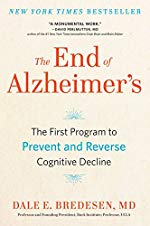The End of Alzheimer's
September 24, 2019 10:42 AM - by Dale Bredesen - Subscribe
In this paradigm shifting book, Dr. Bredesen offers real hope to anyone looking to prevent and even reverse Alzheimer's disease and cognitive decline. Taking insights gleaned from over 40 years in medicine, Dr. Bredesen has authored a groundbreaking guide to prevent and reverse Alzheimer’s Disease that fundamentally changes how we understand cognitive decline.
Revealing that Alzheimer’s disease is not one condition, as it is currently treated, but rather three distinct conditions, The End of Alzheimer’s outlines 36 metabolic factors (micronutrients, hormone levels, sleep) that can trigger "downsizing" in the brain. The protocol shows us how to rebalance these factors using lifestyle modifications.
blurb via
Revealing that Alzheimer’s disease is not one condition, as it is currently treated, but rather three distinct conditions, The End of Alzheimer’s outlines 36 metabolic factors (micronutrients, hormone levels, sleep) that can trigger "downsizing" in the brain. The protocol shows us how to rebalance these factors using lifestyle modifications.
blurb via
He outlines his program in the book, and you don't need his clinic to run the tests he recommends. I get the impression it's more that he's an expert who is kind of oblivious to the expense of testing, plus it's his passion, so he probably thinks it's worth it, anyway.
In the book he mentioned having a hard time getting human testing approved because western science wants to test for just one thing at a time, and his whole point is that it's not going to be just one thing. It's like monocrop mindset vs permaculture mindset, but for healthcare. It sounds like the review system isn't set up to study the healthcare equivalent of a polyculture. Here's the author's publication history, if that helps.
His strength seems to be in identifying correlations. This book will tell you what you need to fix and why, but he's not (in my opinion) an expert in how best to get there.
I was prepared for a quack when I picked the book up from the library, but I ended up thinking it was good enough to share.
posted by aniola at 10:08 AM on September 25, 2019
In the book he mentioned having a hard time getting human testing approved because western science wants to test for just one thing at a time, and his whole point is that it's not going to be just one thing. It's like monocrop mindset vs permaculture mindset, but for healthcare. It sounds like the review system isn't set up to study the healthcare equivalent of a polyculture. Here's the author's publication history, if that helps.
His strength seems to be in identifying correlations. This book will tell you what you need to fix and why, but he's not (in my opinion) an expert in how best to get there.
I was prepared for a quack when I picked the book up from the library, but I ended up thinking it was good enough to share.
posted by aniola at 10:08 AM on September 25, 2019
Alzheimer's runs in my family and my partner's family, we both intend to do the recommended tests when we hit our 40s.
posted by aniola at 10:11 AM on September 25, 2019
posted by aniola at 10:11 AM on September 25, 2019
Yep, that's the problem with science, it's really slow. Turns out there is no cancer but over a hundred different syndromes.
After just a bit more reading I get that Dr Bredesen is not a quack and deeply sincere. But does he have something more than the standard knowledge (eat right, get exercise, social interaction)? Does he have something new or just lucky or is he "subconsciously" filtering for patients that would be success stories in most conditions? Very skeptical about any talk of extra vitamins making a difference (other than known conditions due to a deficiency).
posted by sammyo at 7:50 AM on September 26, 2019
After just a bit more reading I get that Dr Bredesen is not a quack and deeply sincere. But does he have something more than the standard knowledge (eat right, get exercise, social interaction)? Does he have something new or just lucky or is he "subconsciously" filtering for patients that would be success stories in most conditions? Very skeptical about any talk of extra vitamins making a difference (other than known conditions due to a deficiency).
posted by sammyo at 7:50 AM on September 26, 2019
Check the book out from your library and report back!
posted by aniola at 7:04 PM on September 27, 2019
posted by aniola at 7:04 PM on September 27, 2019
I only remember him advising vitamins in response to known conditions due to lab results.
posted by aniola at 8:19 PM on September 27, 2019
posted by aniola at 8:19 PM on September 27, 2019
You are not logged in, either login or create an account to post comments

posted by sammyo at 8:43 PM on September 24, 2019 [1 favorite]